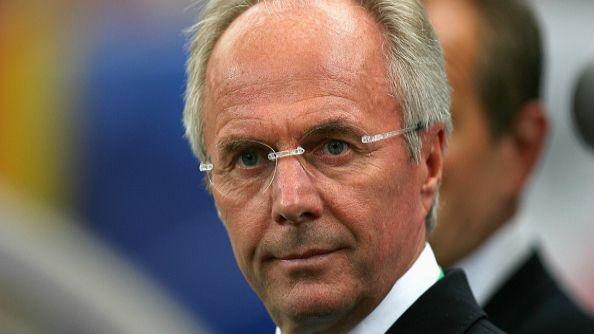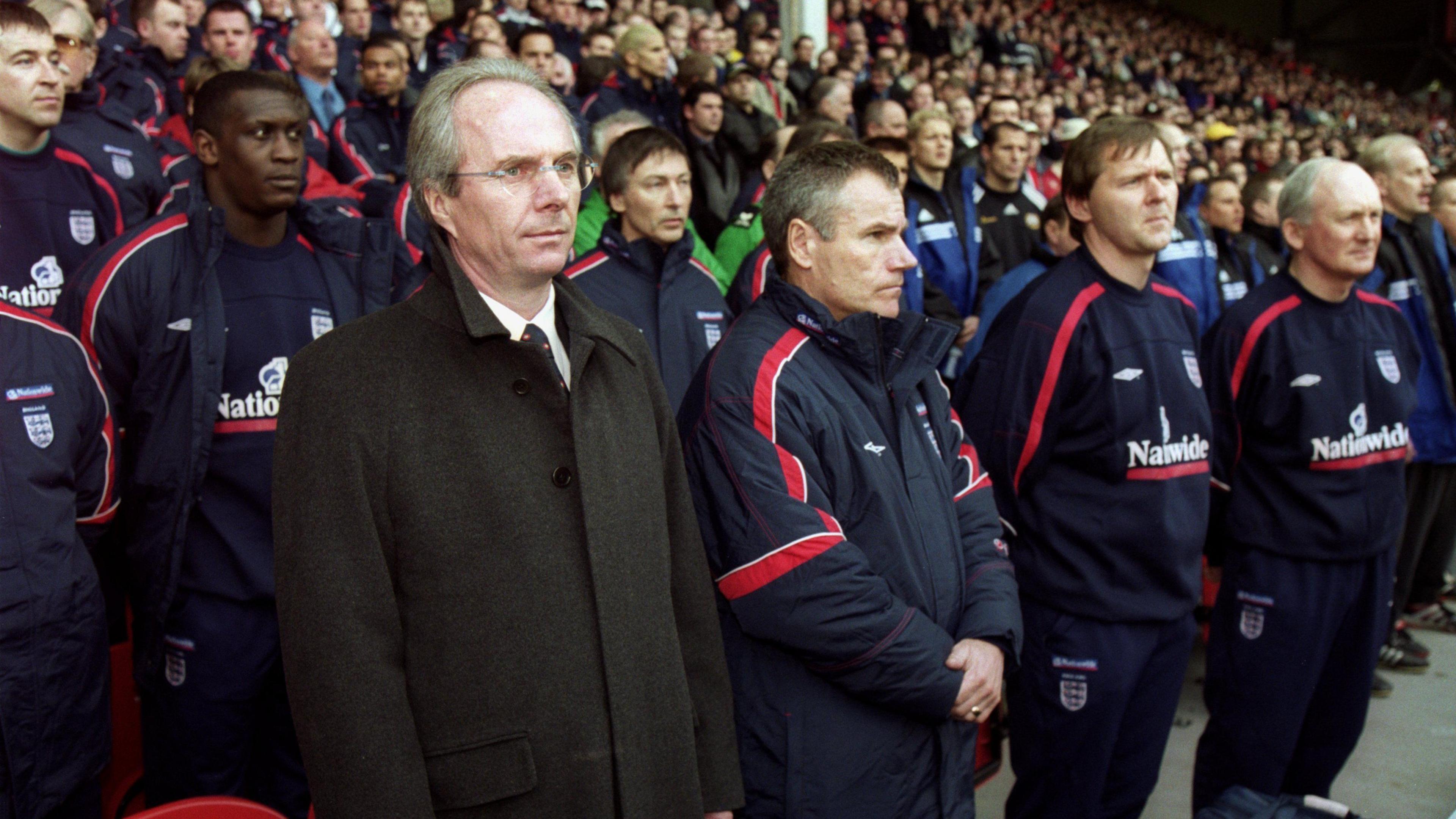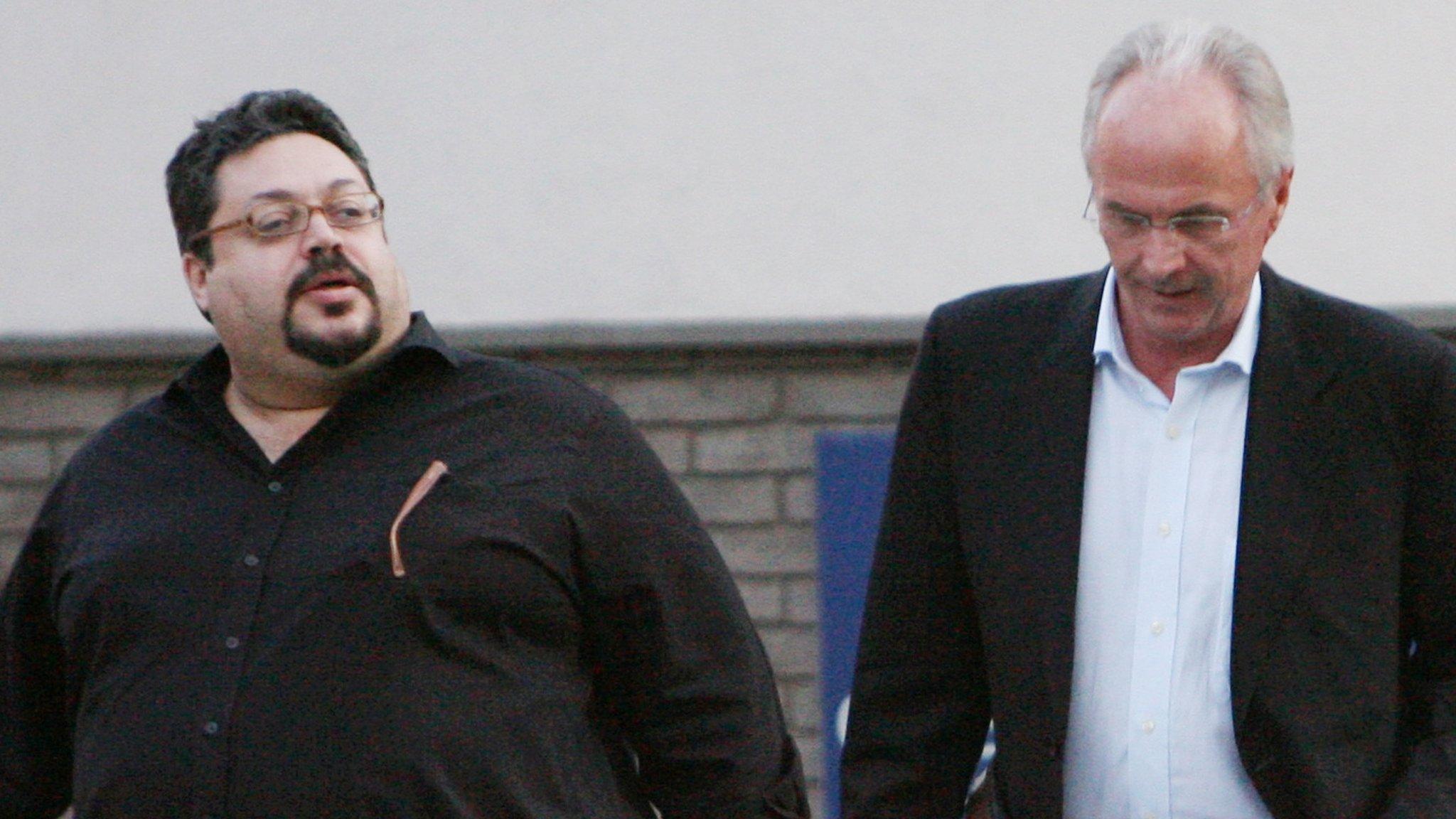'Don't be sorry, smile' - Eriksson in new film

Former England manager Sven-Goran Eriksson reflects on his life in an emotional new film
- Published
Former England manager Sven-Goran Eriksson says that he hopes to be remembered as "a positive guy, trying to do everything he could do".
The 76-year-old Swede said in January that he had "best case a year" to live after being diagnosed with cancer.
In a touching new film about him, due to be released on Amazon Prime on 23 August, Eriksson says he has had a "good life", telling viewers, "don't be sorry, smile", before saying "thank you for everything coaches, players, the crowds. It’s been fantastic".
Eriksson was the first foreign coach to manage England and led the side to the quarter-finals of the 2002 and 2006 World Cups and 2004 Euros.
Prior to that appointment, he had success across Europe, winning the Swedish, Portuguese and Italian top divisions with Gothenburg, Benfica and Lazio.
Outside of football he has had a colourful life, including high-profile affairs with Ulrika Jonsson and Faria Alam, as well as being victim of a 'Fake Sheikh' tabloid sting and a scam involving Notts County, a fraudster called Russell King and the state of North Korea.
Here are just a few things we learned from 'Sven'.
'I didn’t do anything criminal' – Eriksson on affairs
During his time as England manager, Eriksson's relationship with Italian lawyer Nancy Dell'Olio attracted a lot of press speculation.
Dell'Olio says of her former boyfriend, "people in power always have an extra sex appeal".
Before the 2002 World Cup, the Daily Mirror broke a story that the England manager was having an affair with Swedish-British television presenter Jonsson.
Reflecting on that time, Eriksson says "sex is one of many good things in life for all of us" and that "I didn’t do anything criminal".
In 2004, just months after England's exit from the European Championship, it emerged that then-FA secretary Alam had been in a relationship with Eriksson, as well as with FA chief executive Mark Palios.
During the film, Alam describes how she fell for the Swedish manager, who would "talk to me about poetry, he'd talk to me about art".
She resigned from her post after the relationships became public and says she was used by the FA as a scapegoat. The 58-year-old claims that Eriksson encouraged her to sell her story in order to "make some money" after it had become difficult to find other work.

Eriksson's first competitive match in charge of England was a 2-1 win over Finland at Anfield in 2001
Dismissal from England job
Before the 2006 World Cup Eriksson found himself caught up in another embarrassing story, when a recording emerged of him telling News of The World journalist and so-called Fake Sheikh, Mazher Mahmood, that Aston Villa was for sale and that then England captain David Beckham would return from Real Madrid to play in England if Eriksson asked him to.
Afterwards, Eriksson was told by the FA that he would be replaced as England manager after the World Cup in Germany.
During the film, the Swede says he asked the FA not to release news of his successor until after the World Cup. However, one month before the tournament, it was announced that Eriksson's assistant Steve McClaren would take over from him.
"I’m the boss, but in a month he's going to take over," Eriksson describes, adding "you should avoid that".
Clashes with Sir Alex Ferguson and protecting Wayne Rooney
Wayne Rooney was England's 18-year-old talisman at Euro 2004, but fans were left wondering what might have been when he had to come off injured during a quarter-final loss to Portugal, having broken a metatarsal bone in his right foot.
Just months before the 2006 World Cup, the former Manchester United forward once again fractured a metatarsal bone in the same foot.
Eriksson reveals he had "a lot of phone calls" from Rooney's then-club manager Sir Alex Ferguson over the youngster's fitness. He describes the former United boss as a "strange man", saying "when you touch Manchester United in a way he doesn't like, he stops to be a gentleman".
Rooney did travel to Germany and England faced Portugal in the quarter-finals once again. This time, Manchester United's record goalscorer was sent off for a stamp and history repeated itself when the Three Lions again lost on penalties.
In his final press conference as England manager, Eriksson called Rooney the "golden boy of English football" and implored the press not to "kill him".
Rooney says that the fact his boss chose to defend him as his "last duty as England manager" shows "the class of Sven".
'Beautiful' to fulfil Liverpool dream - Eriksson
- Published23 March 2024
Former England boss Eriksson has terminal cancer
- Published11 January 2024
Notts County, North Korea and a major scam
In 2009, convicted fraudster Russell King persuaded Eriksson to join League Two club Notts County as director of football following a takeover that promised to bring millions of pounds of Middle Eastern investment.
Stars including Sol Campbell and Kasper Schmeichel were brought onboard, but the promised investment never materialised and players stopped getting paid, leading Campbell to walk away.
Meanwhile, King claimed that his Swiss-based mining company had assets worth almost $2 trillion because it had the rights to North Korea's gold, coal and iron ore and persuaded Eriksson to join a delegation to the secretive East Asian state.
"First of all I did not want to go to North Korea, at all, but the owners said I had to go because it was to get money," explains the 76-year-old.
Eriksson describes his stay in the country as being confined to "a hotel in a big park" which was guarded by men with weapons.
He also describes a meeting with regime officials in which he was asked to secure an easy group for North Korea in the 2010 World Cup.
After resigning, Eriksson wrote off £2.5m owed to him by Notts County to help the club in its battle to survive, and a local businessman called Ray Trew struck a deal to buy the club for £1.
Related topics
- Published25 March 2022

- Published16 August
